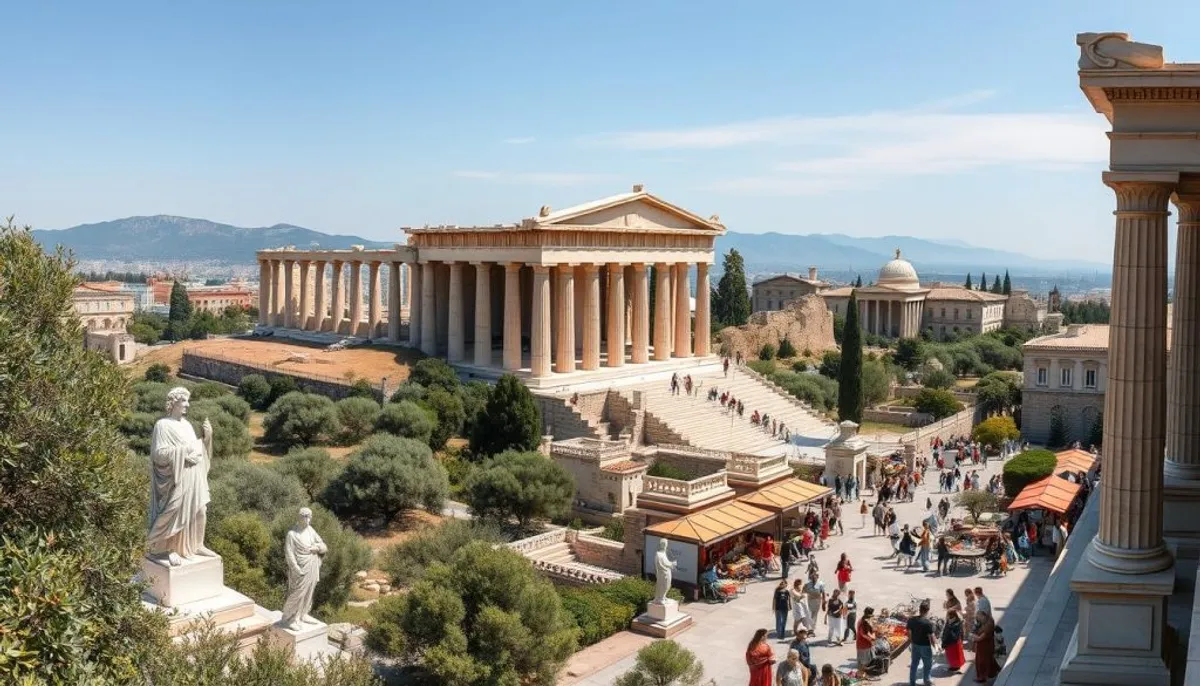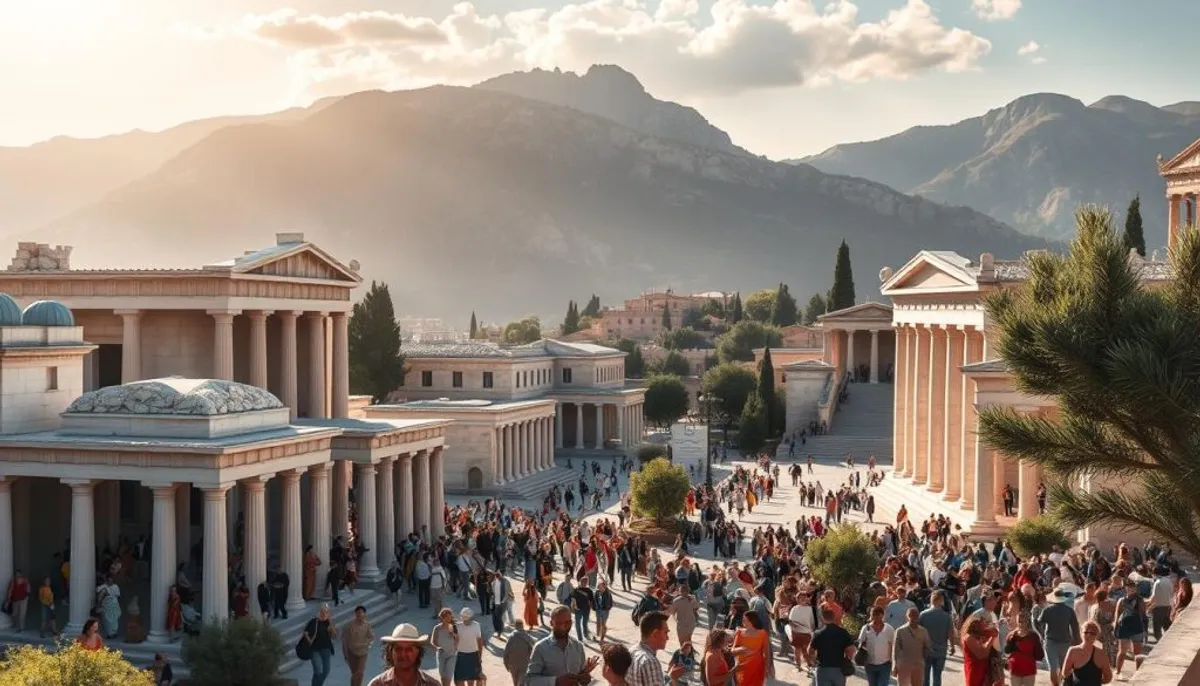The Greek civilization, which emerged in the 8th century BC, profoundly shaped Hellenic identity. This period, known as Ancient Greece, left a vast cultural legacy. The city-states of Athens and Sparta established innovative political systems. The Athenian democracy, in particular, laid the foundations for our contemporary governments.
The Greek legacy transcends the political sphere. The Olympic Games, created in 776 BC, united the Greek city-states. Architecture gave rise to the Doric, Ionic, and Corinthian styles, profoundly influencing art and construction. In sciences, figures like Euclid and Archimedes revolutionized geometry, making major contributions to human knowledge.

Agriculture played a crucial role in the Greek economy. Barley, wheat, olives, and vines were the dominant crops. Artisans, often non-citizens, worked in workshops called ergastèrion. This unique blend of culture, science, and art forged a lasting legacy, still influencing our world today.
What is the common culture of the Greeks
Ancient Greek culture is rooted in essential principles that shaped the identity of the Hellenes. These unifying foundations ensured cohesion, even in the face of fragmentation into city-states.
The Greek language as an identity foundation
The Greek language is the pillar of Hellenic identity. It was spoken in all city-states and colonies, allowing the transmission of legends and literature. The epic poems of Homer, the Iliad and the Odyssey, dating from the 7th century BC, were known to all Greeks of antiquity.
Shared religious beliefs
The Greek mythology plays a crucial unifying role. The Greeks adhered to polytheism, worshiping many deities. The Olympian pantheon includes gods like Zeus, Hera, and Athena, each associated with specific attributes. The Greeks honored their gods through prayers, offerings, and sacrifices.
The importance of traditions and rites
The Hellenic traditions are notably manifested through the major pan-Hellenic festivals. These events, such as the Olympic Games in Olympia, gather Greeks from all city-states every four years. They include sporting competitions, theatrical performances, and religious ceremonies, thus reinforcing cultural unity.
| Cultural Element | Importance | Example |
|---|---|---|
| Greek language | Vector of identity | Homeric poems |
| Religious beliefs | Spiritual cohesion | Worship of the Olympian gods |
| Traditions | Pan-Hellenic unity | Olympic Games |
The foundations of Hellenic civilization
The Hellenic civilization was built on solid principles, profoundly influencing the history of Ancient Greece. From 800 BC, Greek territories expanded, illustrating their growth. At the center of this civilization were the city-states, called polis.
The emergence of city-states
The Greek polis were characterized by their independence. They had their own currency, their army of hoplites, and their defense system. Each city consisted of a countryside, a port, an acropolis, an agora, and fortifications. Their interaction occurred mainly through trade and conflicts.

The development of democracy
Athenian democracy evolved gradually. In 594 BC, Solon's reforms laid the first foundations. The fall of tyranny in 510 BC paved the way for democracy with Cleisthenes' reforms. This system profoundly marked the political institutions of Ancient Greece, highlighting the importance of traditions that shaped this evolution.
The social and political organization
Greek society was based on the concept of citizenship. Only free men born of citizen parents had the right to participate in political life. Women, slaves, and foreigners were excluded. Institutions such as the Ecclésia (assembly) and the Boulè (council) allowed citizens to deliberate on the city's decisions, essential to the Athenian democracy.
| Period | Key Event |
|---|---|
| 776 BC | Creation of the Olympic Games |
| 8th century BC | Emergence of great poets (Homer, Hesiod) |
| 594 BC | Solon's reforms in Athens |
| 510 BC | Establishment of Athenian democracy |
The cultural and artistic legacy
Ancient Greece left an invaluable cultural and artistic legacy. This heritage shaped European identity. It continues to influence our modern world, thanks to a millennia-old civilization.
Architecture and iconic monuments
Greek architecture is synonymous with classical perfection. The Parthenon, located on the Acropolis of Athens, embodies this quest for harmony and proportion. Its Doric columns and sculpted friezes demonstrate Greek architectural genius.
Literature and poetry
Greek literature created timeless masterpieces. Homer's Iliad and Odyssey laid the foundations of Western epic. Greek tragedy, with Aeschylus, Sophocles, and Euripides, explored the human condition, influencing theater to this day.
Visual arts and sculpture
Greek sculpture reached peaks of refinement. The statues of Phidias and Praxiteles embody the ideal of classical beauty. Ancient ceramics, with its painted vases, offers a valuable testimony of daily life and Greek myths.
| Artistic Domain | Iconic Work | Influence |
|---|---|---|
| Architecture | Parthenon | Neoclassical style |
| Literature | Greek tragedy | Western theater |
| Sculpture | Venus de Milo | Canons of beauty |
| Ceramics | François Vase | Decorative arts |
The scientific and philosophical innovations
Ancient Greece was the cradle of significant progress in philosophy and mathematics. These advancements, along with effective introduction techniques, shaped Western thought, profoundly influencing our era.
The major schools of thought
Greek philosophy began in the 6th century BC in Miletus. Thales, Anaximander, and Anaximenes laid the first milestones. Their work marked a major shift from oral tradition to written theory, thus enriching the cultural escapades of that time.
Later, Socrates, Plato, and Aristotle founded influential schools. Plato's Academy and Aristotle's Lyceum trained many philosophers. These schools encouraged critical thinking and rationality.
Mathematical and astronomical advancements
Greek mathematicians created the foundations of geometry and algebra. Pythagoras, Euclid, and Archimedes developed essential theories. Their contributions enriched mathematics and influenced astronomy and physics.

The influence on modern thought
The legacy of Greek philosophy and Greek mathematics continues to influence our thinking. The ideas of Socrates, Plato, and Aristotle are still studied. Their scientific and logical methods are at the heart of our contemporary research.
This intellectual revolution changed our understanding of the world. It replaced mythological explanations with rational theories. This legacy continues to inspire today's science and philosophy.
The expansion and influence of Greek culture
Hellenization, a phenomenon of cultural expansion, shaped ancient history. The conquests of Alexander the Great marked a turning point, paving the way for the Hellenistic era. During this period, from 323 to 31 BC, Greek traditions blended with Eastern cultures, giving birth to a unique culture.
Cultural exchanges reached an unprecedented level. The Greek language spread, becoming a tool for communication throughout the Mediterranean. This influence persisted under the Roman Empire, with Greek remaining the language of culture and knowledge.
| Period | Dates | Key Events |
|---|---|---|
| Classical Era | 480-323 BC | Peak of Greek culture |
| Hellenistic Period | 323-31 BC | Expansion of Hellenization |
| Roman Greece | 146 BC – 330 AD | Assimilation of Greek culture by Rome |
The Greek legacy traversed medieval Europe via Byzantium and the Arab world. Greek physicians supplanted Roman healers in Rome. Roman sculptors imitated the works of Phidias and Praxiteles. Architecture, as shown in Vitruvius' catalog in the 1st century BC, testifies to the Greek imprint on Roman constructions.
Conclusion
The Greek cultural legacy plays a crucial role in shaping Western civilization. The city-states, emerging as early as the 8th century BC, created a common identity despite their rivalries. The Greek language, religious beliefs, and traditions, such as the Olympic Games, reinforced this unity.
Athenian democracy, with its principle of equality among citizens and obedience to the laws, laid the foundations for current humanist values. Hellenic culture spread through colonization and trade, disseminating these ideals around the Mediterranean. These influences have profoundly marked future societies.
Greek contributions in the arts, sciences, and philosophy continue to inspire our era. From literary works like the Iliad to mathematical and astronomical advancements, the Greek legacy remains an inexhaustible source. It inspires our current society, stimulating reflection and creativity.
RelatedRelated articles


